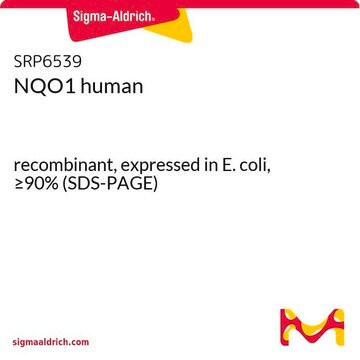N9284
Nitroreductase from Escherichia coli
≥90% (SDS-PAGE), recombinant, expressed in E. coli
Synonyme(s) :
NTRA
About This Item
Produits recommandés
Produit recombinant
expressed in E. coli
Niveau de qualité
Pureté
≥90% (SDS-PAGE)
Forme
lyophilized powder
Activité spécifique
≥100 units/mL
Poids mol.
monomer 24000
Caractéristiques du produit alternatif plus écologique
Waste Prevention
Safer Solvents and Auxiliaries
Design for Energy Efficiency
Learn more about the Principles of Green Chemistry.
sustainability
Greener Alternative Product
Numéro d'accès UniProt
Autre catégorie plus écologique
Conditions d'expédition
wet ice
Température de stockage
−20°C
Informations sur le gène
Escherichia coli K12 ... nfsB(945483)
Description générale
Application
Actions biochimiques/physiologiques
Propriétés physiques
Définition de l'unité
Notes préparatoires
Code de la classe de stockage
13 - Non Combustible Solids
Classe de danger pour l'eau (WGK)
WGK 3
Point d'éclair (°F)
Not applicable
Point d'éclair (°C)
Not applicable
Certificats d'analyse (COA)
Recherchez un Certificats d'analyse (COA) en saisissant le numéro de lot du produit. Les numéros de lot figurent sur l'étiquette du produit après les mots "Lot" ou "Batch".
Déjà en possession de ce produit ?
Retrouvez la documentation relative aux produits que vous avez récemment achetés dans la Bibliothèque de documents.
Les clients ont également consulté
Notre équipe de scientifiques dispose d'une expérience dans tous les secteurs de la recherche, notamment en sciences de la vie, science des matériaux, synthèse chimique, chromatographie, analyse et dans de nombreux autres domaines..
Contacter notre Service technique![Nitrate Reductase (NAD[P]H) from Aspergillus niger lyophilized powder, ≥300 units/g solid](/deepweb/assets/sigmaaldrich/product/images/309/282/2a67ae4d-ca55-4f0b-96ec-34748ff8a21e/640/2a67ae4d-ca55-4f0b-96ec-34748ff8a21e.jpg)









